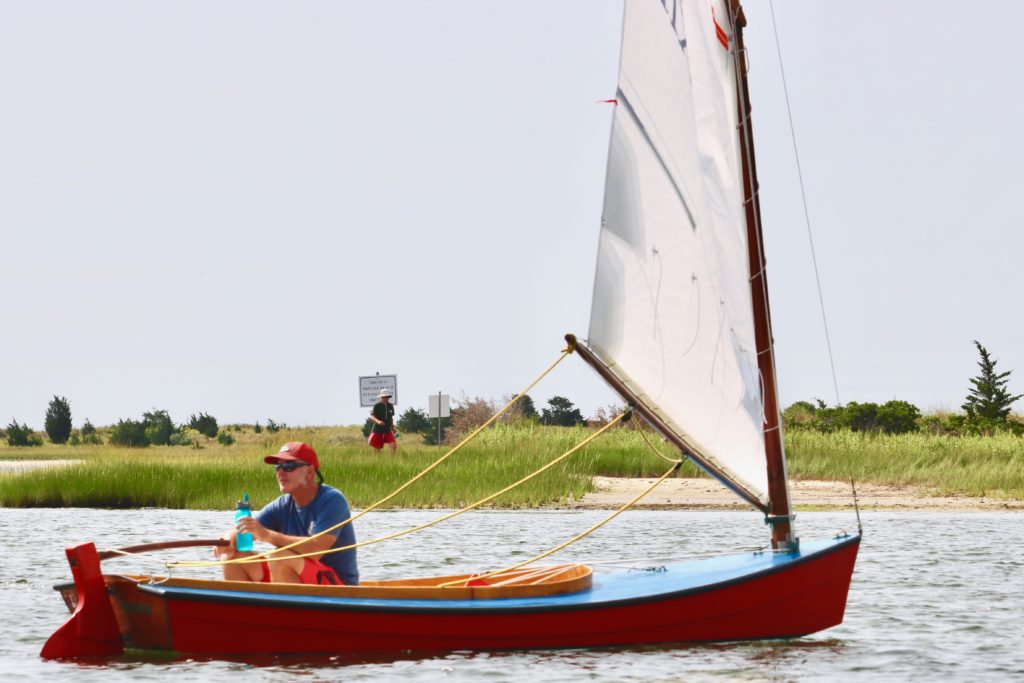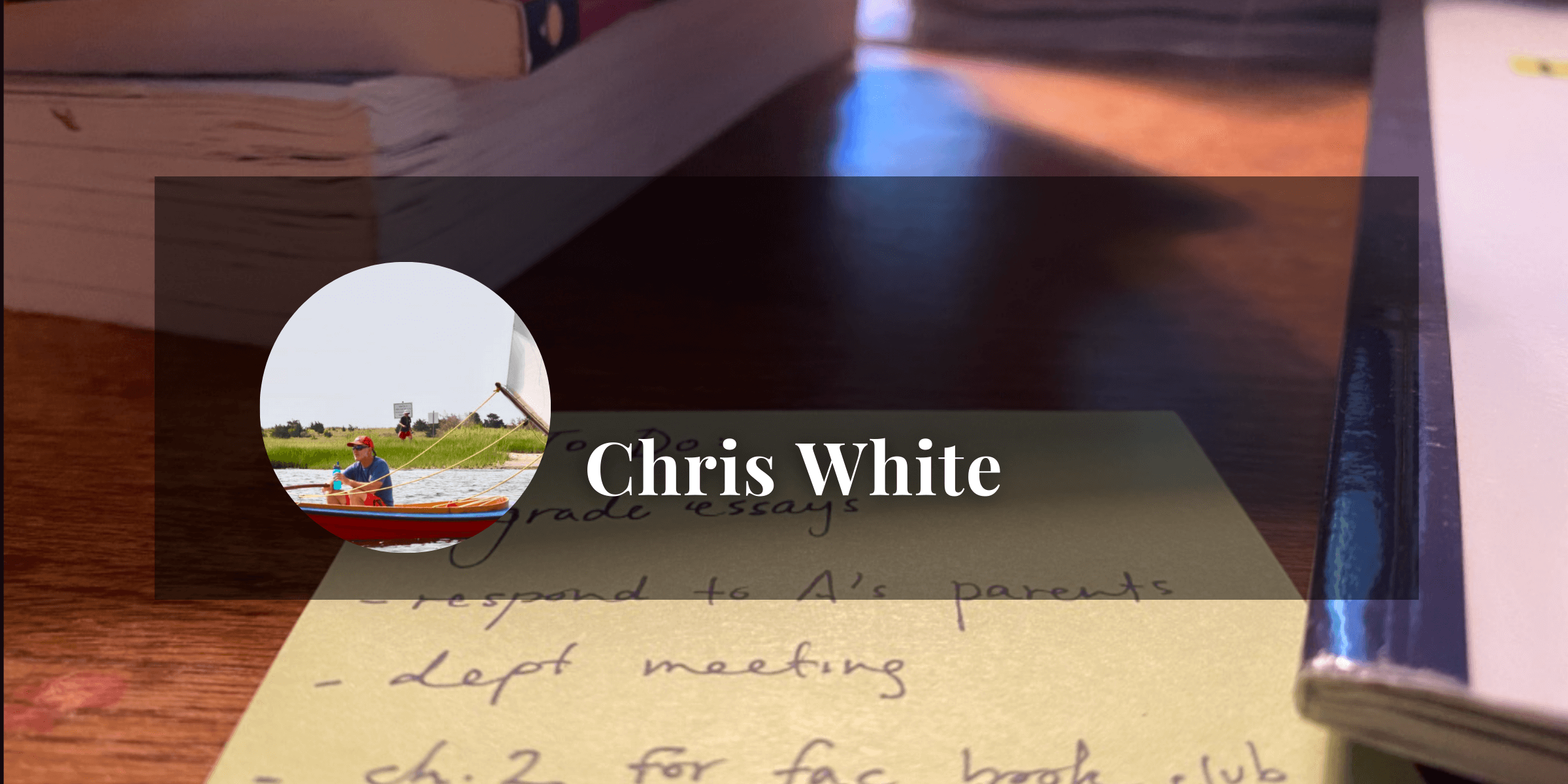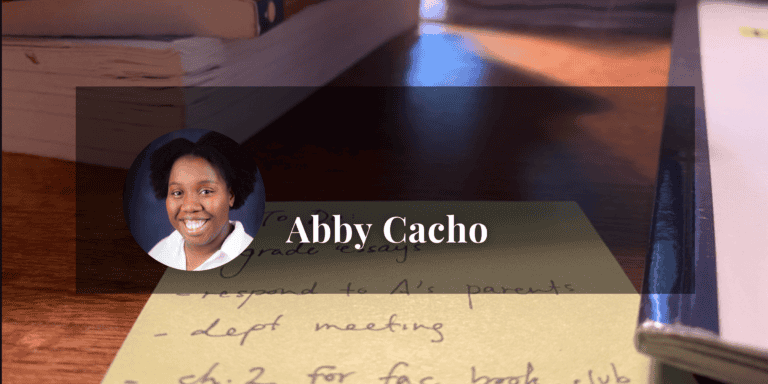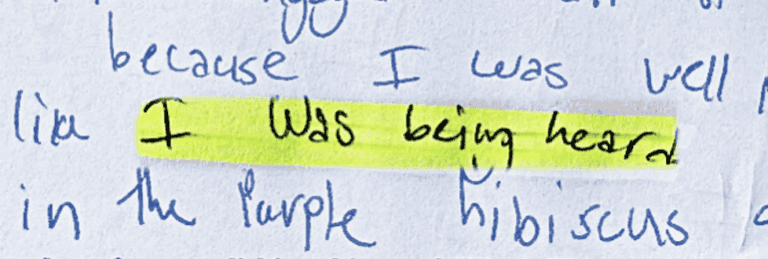Protagonists: 20 Minutes with Chris White
The Protagonists series highlights the main characters of our mission: the teachers out there hustling to make their students feel known, heard, and challenged through student-led discussion.
Chris White, English Teacher at Tabor Academy
Hometown I think of Craftsbury, Vermont as my hometown. I haven’t lived there in a long time, though. I currently live in Marion, Massachusetts, where I’ve lived for fourteen years.
Favorite teacher growing up: who and why? In high school, Clare Nunes taught me English at Concord Academy (MA). It’s hard to pinpoint exactly how and why she was my favorite teacher, but it was really clear that she cared about me as a person and as an individual, and she really cared for all of her students. At the end of sophomore year, she wrote a note on my final essay that said, “take care of yourself,” which she meant literally. She wanted me to succeed, and she advocated for me when other teachers thought I was a lost cause. I felt included in her classes and like I was of value and like my ideas were worth pursuing. She also helped me develop as a writer. I try to write with strong action verbs, and this goes back to Clare’s insistence that I avoid using “to be.”
Describe yourself as a student in three words At Concord Academy, I had low pretty self esteem. I was shy, but I also wanted to be creative. With so many talented and brilliant people around me, I was often afraid to take artistic risks.
Current City, School, Teaching Assignments (?) I teach English at Tabor Academy in Marion, Massachusetts. I typically teach senior seminars and English II Honors, a sophomore honors class. I’ve taught a bunch of different courses for the seniors; we’re on trimesters, so I teach three per year, and the subject matter can change. All three of my current seminars look at different ways of telling stories. If a student is with me all along, it turns into a full year course, but each one of the seminars can be also work as a standalone. These days, I teach a class that’s based around “The Hero’s Journey,” called “Rebel, Rebel.” We use Dune as the main text, and pair it with Star Wars and The Princess Bride. The next class is called “Firefly,” where the TV show Firefly is the main text. I ask students not only to analyze the story and the type of narrative there, but also to look at how visual storytelling is different from novels. The narrative focus “Band of Five” trope. This structure has the leader, the lancer (second in command who both supports and challenges the leader), and three other key roles: the Heart (the empath), the big guy (muscle), and then either the fool or the smart guy (in Firefly it switches around). You have a core five characters and that’s the narrative focus of the course: how do you tell stories using this framework? How do conflicts within the group of 5 create drama and drive the plot? The last senior seminar is called “Masters of Suspense.” What I’ve done most years is make it more of a Film Studies class, specifically a Hitchcock class. They look at the TV show Alfred Hitchcock Presents and then do The 39 Steps and work through big hits of the 50s— Strangers on a Train, Rear Window, Vertigo, and North By Northwest. Usually we finish with Psycho. Students also read The Shining, the novel by Stephen King, and then compare his suspense devices in the novel with Hitchcock’s. I’m always delighted when kids return from college and tell me about the film classes they’ve discovered at their new schools.

Favorite historical figure (or best line from history?) History is tricky because it’s so often far less true than fiction. In fiction, writers use “made up” stories to deliver deep truths; in history, writers take real life events and then bend them to serve their purposes. In most cases, those narratives only serve the ruling class. I’m still irritated that for a few years when I was a kid, I believed Andrew Jackson was a great president.
Favorite literary character (or best line from a novel?) I have some. I guess really my favorite is probably Hamlet. I’ve taught him a lot. I used to use the play with seniors, and now we use it for English II Honors. I like how complex he is and what a bizarre version of the tragic hero he is. I’m pretty fascinated with him. I like Ree Dolly from Winter’s Bone. Not in the movie—the movie cuts out a lot of her character, it basically sanitizes her and removes key pieces of her identity—but in the novel she’s really interesting. She’s a very clear “Hero’s Journey” character. I also like a number of characters in Game of Thrones / the A Song of Ice and Fire series. I really like Arya Stark and Jamie Lannister—they’re probably my two favorite characters from those books. But I also like Jon Snow quite a lot. And I really like Harry Potter and Hermione Granger, though it’s been irritating to see JK Rowling be a mean TERF (trans exclusionary radical feminist) troll these days.
Favorite school supply? The thing I’m most dependent on is my computer. I’m sort of fond of it, because, you know how kids put stickers on their computers? I do the same thing. I have a little Southern Poverty Law Center sticker and a sticker from a program I created with a bunch of kids here called Seawolf Cycling. Our logo is an Orca built into a mountain bike. So I’ve personalized the exterior of my computer the same way my friends and I used to personalize our Trapper Keepers in 7th and 8th grade. Back then, in 1983-4, the height of pop music, we’d have stickers from The Police and Def Leppard and David Bowie plastered all over there.
Pet peeve about class (student-led?) discussion? I have two things on opposite ends of the spectrum. One is when kids clearly have not done the reading or preparation at all and not only try to BS their way through but then also become defensive when you sort of call them out on it. I don’t mind when people BS their way through, as long as they’re honest about it. I guess it comes down to dishonesty, or that survivalist mentality that sometimes students get into where they just care about the grade. The other end of discussion that can bother me is kids who are know-it-alls and don’t let anybody else play. I’m not the greatest at classroom management and confrontation and things like that, so when I have a kid who’s particularly dominant, it’s difficult for me to manage that person. I don’t know if that’s a pet peeve, but it’s a challenge.
Favorite moment of class discussion? I like when it’s flowing organically and kids are making jokes and laughing and everybody’s having fun and including everybody. At the same time, though, it can’t get too silly. I like a dynamic of appropriate humor. I think it’s great when kids find things that are amusing that they can share and the whole class finds them amusing. That has to build without the space becoming too chaotic. It’s kind of delicate, especially with sophomores and younger students, though that wild energy also emerges most often with them. I like the wildness, but to a point.
Text you count on to inspire conversation? I always look forward to V for Vendetta with my sophomore class, though part of the reason is because it’s the last thing that we teach in the course. By the time my students arrive there, they’ve gone through a unit on short stories, usually Winter’s Bone, Hamlet, Things Fall Apart, and 1984. They’ve done this big arc of a bunch of different types of stories, and 1984 is really interesting and grim and depressing. V for Vendetta kind of riffs on a lot of the ideas in there but does so in ways that are maybe more exciting; it also gets into all sorts of Easter eggs and pop culture references. There’s a whole chapter where V is essentially acting out the Rolling Stones’ “Sympathy for the Devil.” It’s fun to lead the kids there and see if anybody’s going to pick it up, if they’ll notice the inverted pentagram on the bishop’s bed or the lingering image of V’s mask in the pupil of a traumatized villain’s eye. They’re always kind of delighted to find these things out. It’s usually pretty fun, and it usually gets kids thinking a lot about a variety of things: Plato’s Allegory of the Cave, synchronicity, and ideas about anarchy and fascism and political structures. They begin to ask: when is it appropriate to rise up against a government or system of authority? So they’re looking at big ethical, moral issues they’ve been looking at all year long, and the class culminates there. With my seniors, often the most fun story is Firefly. As we get into the middle of the show, say Episode 5, kids really buy into the characters and connect with what’s going on and how the story is proceeding. If they can reach a point where they understand the story and its bigger ideas while simultaneously figuring out how the writers make it all work, it’s pretty rewarding. That’s really fun.
What do you nerd out about? Firefly is pretty dang nerdy, and Dune probably is, too. I went through a phase a few years ago where I was nerding out a lot. I got into this podcast called “Binge Mode.” It’s two people, Mallory Rubin (Chief Editor at The Ringer) and Jason Concepcion (who just left and works for Crooked Media). They called it “Binge Mode” because they’d binge a season of Game of Thrones going episode by episode and doing a deep dive on each. They’d talk about the episode, its relationship to the books, and its relationship to fantasy stories in general. They did that, then they did it with Harry Potter. It was the same sort of thing, but they’d read the books and then every three or four chapters they’d do an episode covering those chapters. I had read Harry Potter to my son when he was in the 4th grade and liked it fine then. But this time, when I read it again with “Binge Mode,” I really got “into it” and saw the brilliance of the story. As I was coming to the end, I actually believed that maybe this is the greatest story ever written. But maybe A Song of Ice and Fire will be (if George RR Martin ever finishes it). Certainly the HBO version, Game of Thrones, was not.
I’ve also always enjoyed Star Wars, which “Binge Mode” did too. I kind of got tired of nerding out with that one, and I also kind of got tired of Star Wars. I haven’t even started The Bad Batch, for instance. The new trilogy, and certainly episode nine, was a big disappointment. I agreed with the “Binge Mode” hosts about Episode 8: we all think it’s a really good movie. The final piece, though, Rise of Skywalker tries to make it all generic again with the bloodlines and all that crap. Game of Thrones was the same thing; the TV series got so awful at the end that now I’m at the point with my nerd culture where I just don’t accept that certain things exist. For me, GOT ended really at the end of season 6.
Sometime around this time, when I was nerding out a lot, I decided I needed a new tattoo. I was messing around and saw that somebody had done a mashup of the Deathly Hallows (from Harry Potter) where they had taken different things from the book and designed a tattoo out of them, so I did that too. Now I have a tattoo that is the Deathly Hallows, but the sides of it are skis, the base of the triangle is a mountain bike handlebar, the circle in the middle is the cog of a mountain bike, and the wand down the middle is Luke Skywalker’s lightsaber. In the very middle of the cog is the sigil of House of Stark (from GOT). The whole symbol is then all wrapped up in the Grateful Dead “steal your face” logo. And the triangle in the middle isn’t exactly straight, it’s a set of sails, a jib and a main. The tattoo combines my three favorite sports (sailing, skiing, mountain biking) with my three favorite stories and my favorite band. I don’t regret the tattoo, but my interest in all three of the stories has kind of waned a bit.
When historians recount 2020+, what will they be especially fascinated by? I hope that they’ll be fascinated by the way America overcame an attempted authoritarian coup d’état. The country very nearly succumbed to its worst instincts and very nearly became a fascist state; only the truly extraordinary outpouring and dedication of voters in places like Georgia was able to save our union from racist, destructive, violently anti-democratic forces. So I hope they’ll be able to write that history—a cautionary tale from a nation that leads the world in democratic values and human rights. But I worry that we’re heading toward a fascist future in which we won’t be able to write a true history. I see what’s happening in states like Texas, banning the truth, trying to create a version of propaganda that suits what I see as a white supremacist death cult. It’s extraordinary to me that anybody still supports a man and a movement that are actively killing people by trying to convince them not to take a vaccine.
One prediction for the future of schools? I don’t know a lot about public schools, so it’s hard for me to tell. If authoritarianism and white nationalism continue to rise, the future of all schools looks bleak. So much hinges on the next couple of elections, and if the forces of inclusivity continue to rise, then I think that the future of all types of schools is going to be stronger and lead to a better education. The more people who are involved and able to see themselves in the educational process, the better; I think that strengthens everything. What I fear in the future is a backlash from well-meaning people trying to control what people think. I worry about that on the left end of the political spectrum as well. There are a lot of stories are out there about schools where students cry foul because their teachers are forcing them to think a certain way. Diversity and inclusion include different viewpoints, and we need to include these different viewpoints. If restrictions on student voice prevail, that’s dangerous, no matter what ideas are restricted.
Best advice given to you by a department chair or supervisor? I had a mentor who told me that when I got into teaching at boarding schools that I should focus on doing what my job is and not trying to do other people’s jobs for them. It’s challenging in a boarding environment, where we’re sort of supposed to do a lot of different things. We’re often asking: where does my job start, and where does it end? But what that mentor meant was, I think, that I’m not a headmaster, so I don’t need to do the headmaster’s job. I think that sometimes schools can get kind of political and I think that’s where he’s coming from. I try to stay above the politics. I have found that I’ve needed to assert myself in different ways, because sometimes you have to. But it’s good advice.
Educator-Influencer you count on? First place you turn for classroom advice? My colleague and friend, Helene Sughrue, and I have worked together for eight or nine years developing the English II Honors course at Tabor. She’s the first person I go to with English teaching questions. I don’t talk to her a ton about my senior seminars, but I check things with her a lot. If I have a question about grading, or a question about the meaning of something, or how this fits within the moral paradigms that we’re talking about, I’ll bounce ideas off of her. We’ll talk about ideas that have come up in student discussions or in essays, we’ll calibrate our grading, we’ll help each other out with solutions for reaching particular students more effectively. We don’t “team teach” but we’re on each other’s team, if that makes sense.
Better class discussions will _______________. Lead to more advanced critical thinking and raise the self-esteem of participants in my classes.






